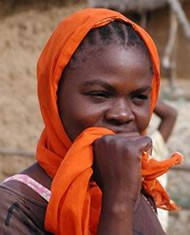Pokomo, Lower in Kenya

Photo Source:
Anonymous
|
Send Joshua Project a map of this people group.
|
| People Name: | Pokomo, Lower |
| Country: | Kenya |
| 10/40 Window: | No |
| Population: | 45,000 |
| World Population: | 45,000 |
| Primary Language: | Kipfokomu |
| Primary Religion: | Christianity |
| Christian Adherents: | 75.00 % |
| Evangelicals: | 25.00 % |
| Scripture: | Complete Bible |
| Ministry Resources: | Yes |
| Jesus Film: | Yes |
| Audio Recordings: | Yes |
| People Cluster: | Bantu, East-Coastal |
| Affinity Bloc: | Sub-Saharan Peoples |
| Progress Level: |
|
Introduction / History
Pokomos are an ethnic group of Kenya, from the Bantu language group. They live along the Tana River riverine and the flood plains. 'Tana' comes from the word 'Chana ', which means river. The Pokomo have always referred to River Tana as 'Chana Maro ', that is River Maro. Probably the word 'Chana' is coined from either side with the Kikuyu word 'Chania ', which is the same word that Kikuyu use to refer to one of the tributary of Tana: River Chania.There are two Pokomo groups, the Lower Pokomos and the Upper Pokomos. These two are divided by linguistic and religious differences. Pokomo society recognizes Upper and Lower divisions and numerous sub-groups and clans.Lower Pokomos inhabit the Tana Delta and lower valley to the Indian Ocean. They have only about one-fourth of the total Pokomo population. Their primary areas include Garsen, Tarasaa, Kipini, Ozi, and river-mouth/delta villages, which are distributed across levees, flood basins, and estuarine zones.
What Are Their Lives Like?
Lower Pokomo Delta communities mix floodplain farming (notably rice), river and coastal fishing, beekeeping, and seasonal grazing niches. Traditional flood canals and basin farming have been fundamental, though hydrological change and extreme floods now cause repeated displacement.Lower Pokomos have a similar clan/village structures as the Upper Pokomos. They have a strong river community identity according to the National Museum of Kenya.
What Are Their Beliefs?
Lower Pokomos are predominantly Christian due to mission activity from the late 19th to early 20th centuries.They also practice traditional religion. 'Kijo' is a group of elders who were believed to possess spiritual powers and were sought whenever the community needed spiritual guidance. There were times during the year when people would gather near the sacred places in the night, singing and dancing 'Gangana', and the spiritual leader would emerge from the forest in the middle of the night, walking on poles covered with a white dress and his face covered with a mask. He will walk around and return to the forest, leaving behind a hysterical group of people who believe their prayers have been answered. Within the Kijo there were two other groups i.e. the 'Gangana' or healers and the 'Chawi' or witches. 'Kijo' were very powerful and they had absolute powers to take by force family lands and banish anybody from 'gaga dya Maro '- Maroland if he goes against the Pokomo norms. The Political governance of the Pokomo was headed by the 'Gasa '. This was also a group of council of elders who were revered and believed to possess wisdom on solving political issues and administering justice. The 'Gasa' is the only elder group that is still in existence, and it is sought to give political guidance to the Pokomo community to date. The Gasa has also been formally recognized to dispense justice on land and family cases.
What Are Their Needs?
Competition over farmland, grazing corridors, and fisheries has periodically escalated conflicts (notably in 2012). Ministries must factor conflict-sensitive approaches.Climate changes have meant more frequent flood that have disrupted schooling, livelihoods, and church services.Lower Pokomos require outside assistance for establishing fisheries and implementing flood management efforts.
Prayer Points
Give thanks for Scripture in Kipfokomo and pray for deep discipleship among Lower Pokomo youth.Pray for peacemakers and just land/water governance in the delta.Pray that Lower Pokomo believers will lovingly witness among Muslim neighbors and kin upstream.Pray for the Holy Spirit to move powerfully in their churches and families, bringing love and peace to their villages.